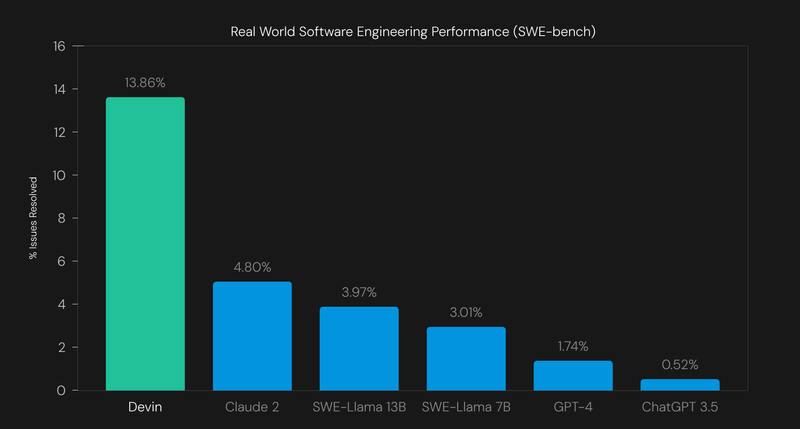The tech industry is witnessing a transformative shift with the introduction of Devin, an AI developed by Cognition. Billed as the first fully autonomous AI software engineer, Devin is at the forefront of AI advancements that promise to augment the capabilities of human engineers while stirring concerns about the future of jobs and wage dynamics within the sector. As AI technologies rapidly integrate into various industries, Devin emerges as a crucial development that encapsulates the potential benefits and challenges of this trend.
Understanding Devin: A Technological Breakthrough
Devin, created by Cognition, is designed to function autonomously, handling a range of software engineering tasks that typically require human expertise. Equipped with developer tools within a sandboxed environment, Devin mirrors the workflow of human engineers, enabling it to code, debug, and deploy software independently. Its ability to collaborate in real-time, learn from interactions, and adapt to new technologies positions it as a powerful tool in software development.
Capabilities and Innovations:
- Advanced Problem Solving: Devin can manage complex engineering tasks that involve thousands of decisions, showcasing its capacity to handle projects that are as complex as those undertaken by human engineers.Devin correctly resolves 13.86%* of the issues end-to-end, far exceeding the previous state-of-the-art of 1.96%. Even when given the exact files to edit, the best previous models can only resolve 4.80% of issues.

- Adaptive Learning: It continuously improves its performance by learning from past interactions and can autonomously update its own AI models.
- Collaborative Nature: Devin actively engages with users, providing updates, receiving feedback, and participating in design decisions, making it a proactive partner in development.
Economic and Societal Implications
The rollout of Devin AI is set against a backdrop of increasing AI adoption, which has stirred a mix of optimism and apprehension among economists and the workforce alike. Recent research from the European Central Bank highlights that while AI has predominantly led to job creation, particularly among the young and highly-skilled, it also poses risks of wage suppression as it may diminish the value of certain skills.
Impact on Software Engineering Jobs:
- Potential for Displacement: The fear that AI could automate significant portions of the software development process, potentially replacing human jobs, is a primary concern among engineers.
- Wage Dynamics: As AI like Devin takes over more responsibilities, there might be downward pressure on wages for tasks that are perceived as less complex or are fully automatable.
- Creation of New Roles: At the same time, Devin also opens up opportunities for software engineers to focus on higher-level tasks such as system architecture and strategic planning, potentially leading to new job roles that require advanced skills.
Here’s a video released by Cognition Labs:
Educational and Professional Adaptation
In response to the changing dynamics brought about by AI tools like Devin, educational institutions are offering specialized courses to prepare current and future leaders for an AI-driven world. For example:
- IIM Lucknow: Chief Executive Officer Programme focused on strategic leadership in the AI era.
- Indian School of Business: Offers courses like Leadership in AI and Chief Digital Officer, tailored to equip leaders with necessary insights and skills for navigating the complexities of AI integration.
These initiatives highlight the importance of strategic skill enhancement to remain relevant and competitive in an increasingly AI-dominated landscape.
The Future of AI Collaboration in Software Engineering
The introduction of Devin and similar AI technologies calls for a reevaluation of the role of human engineers in software development. Rather than viewing AI as a threat, it is more productive to see it as a tool that can enhance human capabilities and free up engineers to tackle more innovative and complex challenges.
Strategies for Integration:
- Embrace AI as an Assistant: Viewing AI like Devin as an assistant that can take on routine tasks can help redefine the role of human engineers to focus on areas where they add the most value.
- Continuous Learning and Adaptation: Ongoing education and skill development will be crucial for software engineers to leverage AI advancements effectively.
- Ethical and Collaborative AI Development: Advocating for and implementing ethical AI practices is essential to ensure that AI tools are used responsibly and transparently.
Learning and Utilizing New Technologies: Devin can autonomously assimilate knowledge from resources like blog posts and apply new technologies to projects.
End-to-End Application Development: Devin exhibits an exceptional ability to conceive, build, and deploy applications, including interactive websites, effectively managing the entire development lifecycle.
Autonomous Debugging: Devin can independently detect and resolve bugs within codebases, reflecting a profound understanding of software diagnostics.
AI Model Training and Fine-Tuning: Devin extends its expertise to the domain of AI itself, capable of setting up and fine-tuning large language models with minimal guidance.
Conclusion: Balancing Innovation with Human Insight
As Devin AI reshapes the software engineering landscape, the industry faces the dual challenge of leveraging AI’s capabilities while addressing the economic and social implications of its widespread adoption. By fostering a collaborative environment where AI complements human expertise, the tech industry can harness the full potential of AI innovations like Devin, ensuring a future where technology amplifies human potential rather than diminishing it. This balanced approach will be key to navigating the evolving dynamics of the workplace, safeguarding the invaluable contributions of human creativity and insight in the era of artificial intelligence.
Frequently Asked Questions (FAQs)
What is Devin AI?
Devin AI is the world’s first autonomous AI software engineer, developed by Cognition Labs. It can handle entire software development projects, from concept to deployment, working alongside human developers to improve efficiency and productivity.
What can Devin AI do?
- Understand natural language instructions and translate them into functional code.
- Plan, design, and build complex software projects independently.
- Write new code and debug existing codebases.
- Continuously learn and adapt to new technologies in the software development field.
How does Devin AI benefit software development?
- Automates repetitive tasks, freeing up human developers for more creative and strategic work.
- Makes software development more accessible, potentially even for those without a strong coding background.
- Significantly accelerates the software development process by handling complex tasks efficiently.
Are there any drawbacks to Devin AI?
- Some experts worry about the impact of AI on software developer jobs.
- Ethical considerations regarding AI-generated code are being discussed.
Is Devin AI publicly available?
Devin AI is currently in early access, but Cognition Labs plans to make it more widely available in the future. You can find more information and inquire about access on their website https://devinai.ai/.
